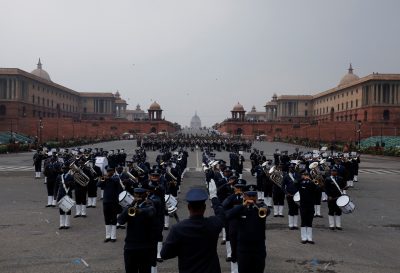Will India save us from China?
The Indo-Pacific concept that now lies at the heart of Australia’s foreign policy assumes that it will. It is founded on the belief that as America’s position in Asia fades, India will step forward to help balance and contain China’s power and prevent it from dominating countries like Australia.

So the Indo-Pacific concept is not just a new way of reading the map. It is a vision of Asia’s strategic and diplomatic future. It imagines that countries right across a vast region stretching ‘from Hollywood to Bollywood’ will stand united and work together to contain China.
Not surprisingly, many find the idea appealing. It crops up all the time now in policy speeches in Washington, Tokyo, Canberra and even, sometimes, New Delhi. Rory Medcalf’s new book, Contest for the Indo-Pacific: Why China won’t map the future, offers the most comprehensive and engaging argument for it yet.
In early March, both the Australian Foreign Minister, Marise Payne, and her Labor Party counterpart, Penny Wong, appeared together to launch Medcalf’s book in Canberra. That says a lot about how eager both sides of Australian politics are to convince themselves and the rest of us, that the Indo-Pacific concept is the answer to the challenge of China.
But it all depends on India — the key to the Indo-Pacific’s strategic heft. With its huge population and economic potential, India alone can develop the power to match China and contain its ambitions. So if the United States pulls back, as it seems destined to do, India will have to take the lead in the Indo-Pacific push back against Beijing.
The question, though is whether India is willing to play that role. Of course India will vigorously oppose any Chinese ambitions to dominate India itself or its neighbourhood in South Asia and the Indian Ocean. But will India care much about what China does in East Asia and the Western Pacific?
This is where the Indo-Pacific concept embodies a critical and highly questionable assumption. By presenting this vast swathe of the earth as one integrated region, it assumes that India and China will both eagerly compete with one another across its entire expanse. If so, India would willingly commit itself to prevent China dominating East Asia.
But that is most unlikely, because neither China’s interests nor India’s are spread equally across this huge slice of the globe. China’s interests are much stronger in East Asia and the Western Pacific, while India’s are stronger in South Asia and the Indian Ocean. Each of them has a huge imperative to stop the other intruding strategically into its own backyard, but neither has anything like the same motives to intrude strategically into the other’s backyard.
That means India is unlikely to challenge China’s strategic ambitions in East Asia and the Western Pacific, as long as China doesn’t challenge India’s equally powerful ambition to dominate South Asia and the Indian Ocean. If China keeps out of the Indian Ocean, India will stay out of East Asia and the Western Pacific.
Medcalf argues that China is already active in India’s backyard, with its massive Belt and Road infrastructure initiative and its support for India’s arch-rival Pakistan. But these have been low-risk, low-cost gambits while India has been relatively weak. The stronger India becomes, the stronger Beijing’s incentives to avoid a direct strategic contest in New Delhi’s backyard which it cannot win.
What gains could China expect from continuing to provoke India in this way as India’s power grows? It is unwise to assume that China will do us all a favour by making such an elementary strategic mistake. And if China agrees not to meddle in India’s backyard, why would India be foolish enough to meddle in China’s? Without India’s interference, China’s ambitions in East Asia would face little effective opposition.
The reality is that, rather than India leading a grand Indo-Pacific coalition against China, it is more likely to cut a deal with China to divide the wider Indo-Pacific region up between them. India will then have an unchallenged sphere of influence in South Asia and the Indian Ocean, and China will have the same in East Asia and the Western Pacific.
This would put Australia in a very interesting position, as one of the countries that lies on the boundary between them. That offers Australia important opportunities to maximise its independence from both the Asian behemoths by playing them off against one another — a bit like the way Mongolia juggles China and Russia.
But it means Australia faces a much more complex, demanding and lonely diplomatic and strategic future than it would have if Medcalf’s enticing vision of the Indo-Pacific somehow materialised instead. The Indo-Pacific concept is so popular in Canberra and elsewhere precisely because it is so reassuring. It is an invitation and an excuse to assume that Australia’s worries about its future in Asia will be solved by other countries, especially India, without much effort of its own. It is the old, familiar story of Australians expecting a ‘great and powerful friend’ to look after it. Australia should be so lucky.
Hugh White is Emeritus Professor at the Strategic and Defence Studies Centre, The Australian National University.
A version of this post originally appeared here on The Australian Financial Review.
Hugh White is Emeritus Professor of Strategic Studies at Australian National University. He served for many years as a senior defence and intelligence official with the Australian government.

Comments
7 responses to “HUGH WHITE.-Why India isn’t going to save Australia from China’s power(EAF 15.3.2020)”
Good but flawed analysis by Hugh White. He is putting old , rather sour , wine , in new bottles. The notion of an Australia-India -US strategic alliance to balance China exists only in the imaginations of Canberra geopolitical analysts. Both Payne and Wong show bipartisan clumsiness in appearing to sponsor such notions . They both need wiser advisers. I particularly agree with Anthony Pun ‘s wise conclusion :
‘It is better for Australia to be friends with both [India and China] and not play wedge politics on the behalf of US. This way, Australia would command an independent third force respected by both China and India; and more importantly, Indonesia.’
One other point.China’s OBOR initiative isn’t an intrusion into India’s strategic space, any more than an Indian merchant ship travelling through the China Seas would intrude into China’s strategic back yard. OBOR is about trade and building the infrastructure for new trade routes . Indian stratehic thinkers understand thid even if Canberra’s Counterparts blinded by their own alliance history do not. There are centuries – Millenia – of shared Chinese-Indian history behind OBOR.
We need not fear it. we should engage with it as a sovereign nation.
As usual Hugh, an astute an penetrating analysis. I doubt that Australia figures any more in the long term strategic calculations of India and China than Kyrgyzstan did in Australian policy in the twentieth century. They both have huge populations to feed, house, and employ and complex neighbourhoods to negotiate. Neither will go to war for or against Australia per se.
When we played “kick-to-kick” after school we would say to a mate: “I’ll wax ya.” In that contract it did not matter which one of us took the high mark, we would split the kicks 50/50. This is what India and China will do with Australia. Such is our complacency, they will not need any weapons stronger than their cheque books
I agree with you absolutely Hugh. We need to gear up to defend ourselves. A good starting point, as you suggest elsewhere, is the Series Two Collins Class submarine construction.
This geopolitical projection and debate relies much on the British empire mentality of the last 200 years. However, there is a much more older thinking and experience between China and India (at lease a few thousand years of being neighbours), which has been lost in the European understanding of the East and Far East when they started to establish colonies in that region.
Prof White statement “India leading a grand Indo-Pacific coalition against China, it is more likely to cut a deal with China to divide the wider Indo-Pacific region up between them. India will then have an unchallenged sphere of influence in South Asia and the Indian Ocean, and China will have the same in East Asia and the Western Pacific” is closer to the truth. Those who believe that India would be on Australian side, will be greatly disappointed.
Both India and China shared a common experience of being “colonized” by European powers and vowed that would never happen again! In terms of culture, religion and philosophy, India and China is more “miscible” than India or China with a European power including Australia.
Both India and China has co-existed for thousands of years with cultural and religious interchange and had not gone to war until the British decided to draw the McMahon line between India and China. Most of the current unrest in that region is a legacy of the British Empire. The only intrusion to India was by the Mongols in the 13th century, and they conquered lands up to Hungary in Europe.
The British legacy also allowed the mixing of the people of India and China together in their colonies as coolies or labourers working for the British Raj. Some 200-300 years of living together outside and India and China indicated that both people can live and work together in harmony with no racial clashes or animosity. Extrapolating this relations to China and India, it is unlikely that India and China will be engaged in a full scale war because there is nothing to fight for.
US power and influence in waning and India will arise to take up a superpower position of her own making but will no squandered her military and economic rise to fight a war with China just to please the Western world. China would also be similarly restrained. Both powers would exert their influence together in the collaborative way.
It is better for Australia to be friends with both and not play wedge politics on the behalf of US. This way, Australia would command an independent third force respected by both China and India; and more importantly, Indonesia.
It seems to me that Australia’s emergence as a successful multicultural society with a good measure of people from throughout Asia now calling Australia home, including many people from China and India, needs to be taken into account in contemplating our future in the region as a large and prosperous island continent. We need to envisage our own way of contributing to the peace and prosperity of our region.
Hugh
Well said. One problem with the pivot and creation of the new Command in Hawaii , of course, was that it specifically excludes Pakistan. Therein likely lie some major challenges in the future! Does the rest of the world – especially Australia – see it that way? The new Command also has a squiggle in its boundary to retain Diego Garcia in Central Command and its future is bound to pose some major issues for our Indo Pacific policy.
It all reads too much like the strategic power games which have led to World War I, this time nuclear.
Will they every learn?